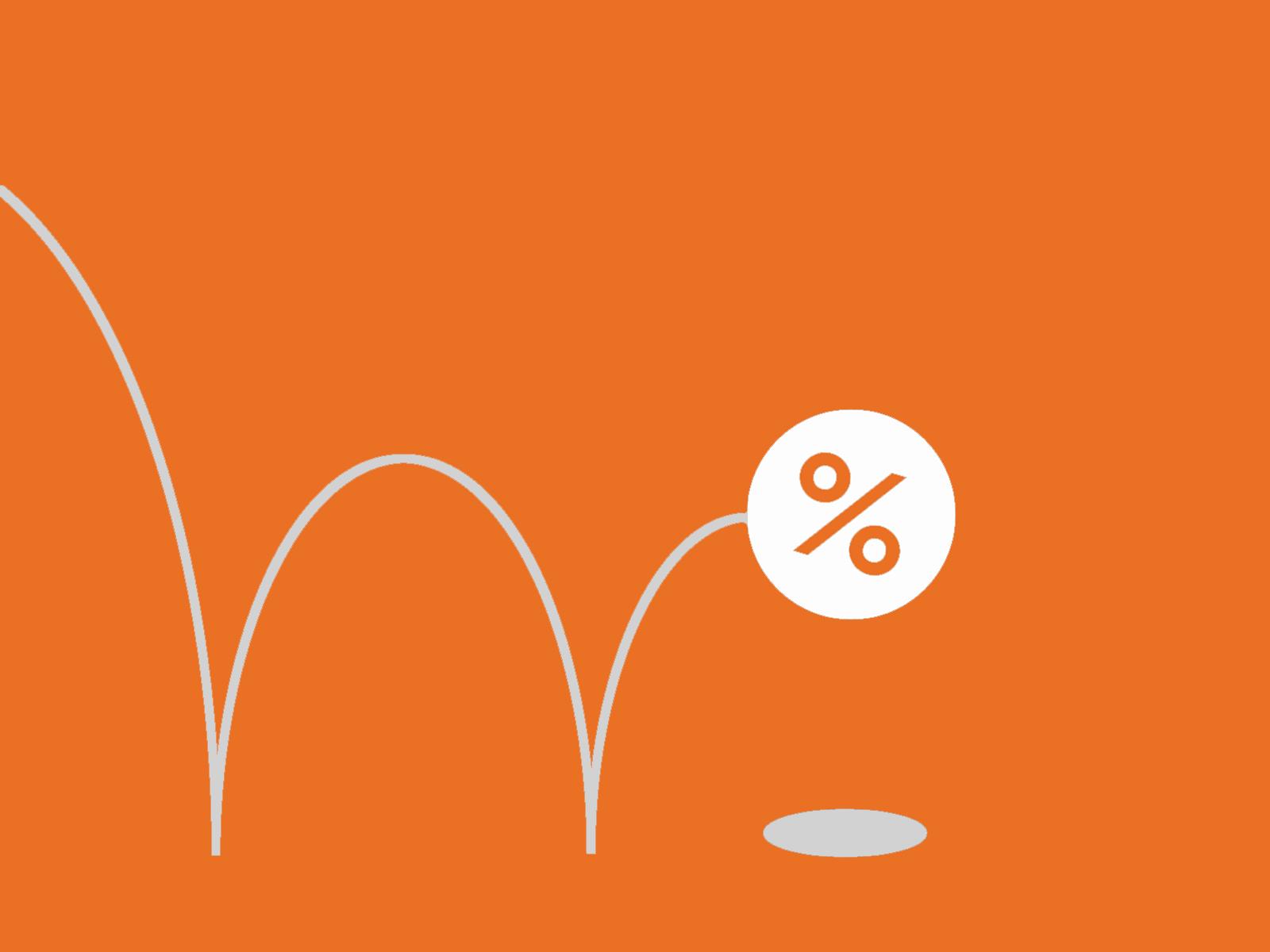Should I get a variable or fixed rate mortgage?
Interest rates have had a wild ride over the last few years, and they’ve taken mortgages along with them.
The Bank of Canada’s policy interest rate—which directly affects variable mortgage rates and indirectly influences fixed rates—climbed from 0.25% in early 2022 to a height of 5% in mid-2023, before easing back down to 2.25% as of November 2025.
So, we're back to the age-old lending debate: should you opt for a fixed or variable rate mortgage?

Where are mortgage rates going now?
The simple answer is no one knows. The Bank of Canada (BoC) watches inflation numbers closely to determine if it will raise, lower or hold its interest rate steady. It can lower the rates to stimulate the economy or raise them to cool things off. The target rate for inflation is 2%, so if inflation is well above or below that, a change to the BoC’s policy rate could be in the works.
If this uncertainty makes you uncomfortable, or you worry your finances can’t withstand the risk of fluctuation, a fixed rate may be the better option for you.
What are your mortgage options today?
There are numerous factors that determine the size of your mortgage payments, including:
- The interest rate on your mortgage
- Your mortgage term (commonly five years, but can range from six months to 10 years)
- Your amortization (the total number of years you have left to pay off your mortgage)
- The amount you have owing on your mortgage (the principal)
- The frequency of payments: whether you choose weekly, biweekly, monthly or accelerated payments determines how much mortgage principal and interest you are paying down each year.
The term, the amortization and the payment frequency can all be adjusted when you renew or apply for a mortgage. But one of the biggest decisions to make is whether to choose a variable or fixed rate.
What is a fixed rate mortgage?
Fixed rate means that you're locked into the rate offered when you sign or renew your mortgage, and you'll know that percentage rate is guaranteed until the end of your term. Banks usually offer one- to five-year terms, with five-year terms traditionally the most popular. Since your interest rate is fixed, your regular payment amount will stay the same for your term.
Pros |
Cons |
|---|---|
As interest rates go up, your payments stay the same. |
As interest rates go down, your payments stay the same. |
Predictability: You know your exact payment amount for a set period, allowing you to budget more accurately for your goals. |
Historically, fixed rate mortgages have often ended up being more costly over time, though that hasn’t always been the case. |
It takes the stress out of following interest rates for the time you’ve locked in. |
Breaking your mortgage tends to cost more. The penalty is generally three months of interest or the interest rate differential, whichever is higher.
|
So what does that mean for mortgage holders who may be facing higher rates at renewal?
“Anyone who currently has a fixed rate mortgage should budget for current market rates at their next renewal date,” cautions James Laird, Co-CEO of Ratehub.ca. “Households should plan ahead to determine where the money is going to come from to make higher mortgage payments.”
What is a variable rate mortgage?
Variable rate means that the interest rate on your mortgage is not fixed. It fluctuates in relation to the bank's prime rate, which follows the policy rate set by the Bank of Canada. The term (e.g. five years) and the spread (e.g. bank prime rate plus or minus .50%) are locked in for a set number of years. Your regular mortgage payment may or may not change, depending on whether your mortgage is designed with set payments. But the amount of principal or interest you're paying on the mortgage does.
👉 Did you know? Tangerine variable mortgage payments fluctuate as the rate changes. This ensures payments on your principal amount stay consistent over time.
Pros |
Cons |
|---|---|
As interest rates go down, so does your mortgage rate. |
As interest rates go up, so does your mortgage rate. |
Historically (but not always), winds up costing less than a fixed rate. |
Unpredictability of future payments can be stressful for some. (The good news is most banks offer the ability to switch to a fixed term.) |
Less expensive to break your contract (generally, three months' interest). |
|
What are the differences between a variable and a fixed rate?
Here are the key differences, at a glance.
Fixed rate |
Variable rate |
|---|---|
Interest rate stays the same throughout the term. As the Bank of Canada changes its rate, there is no impact. |
Interest rate can change throughout the term. As the Bank of Canada changes its rate, so does your rate. |
Payment stays the same throughout the term. |
Payments may change as interest rates fluctuate, or they may stay constant until a “trigger rate” is reached, depending on the mortgage. |
Predictable rate provides stability. |
May provide opportunity to take advantage of declining interest rates. |
You’re locked in for the term unless you refinance. |
In many cases, you can convert to a fixed rate without penalty. |
Breaking the term early often incurs higher penalties due to the Interest Rate Differential (IRD). |
Breaking the term early typically incurs lower penalties (usually three months’ interest). |
Wide range of term lengths, generally between one and 10 years. |
Usually limited to three- or five-year terms. |
How can a variable rate mortgage change over time?
If you’ve had a variable rate mortgage over the last few years, you’ve felt the impact of rate fluctuations in your bank account. Here's an example to illustrate:
January 2022: a homeowner puts a 10% down payment on a $748,450* home with a five-year variable rate of 1.35%**, amortized over 25 years.
- Total mortgage amount: $694,487, including CMHC insurance
- Monthly mortgage payment: approximately $2,728
July 2023: As the Bank of Canada’s policy rate increases to 5% (up from a mere 0.25% in January 2022), the homeowner’s variable rate rises to 6.10%.
- If their mortgage includes payments that vary according to the rate, their monthly bill would increase to $4,485.
- If their mortgage includes fixed payments, their costs would rise when they hit their personal trigger rate. (See below)
November 2025: The BoC’s interest rate has slid back down to 2.25%, and so has the mortgage rate, falling to 3.35%.
- Monthly mortgage payment: approximately $3,413
*January 2022 average home price in Canada was $748,450 (CREA)
**The 5-year variable mortgage rate offered by Tangerine in January 2022 was 1.35%, reflecting the prime rate of 2.45% minus 1.10 percentage points.
A few things to consider about variable rate mortgages
- Short-term risk: Although variable rate mortgages generally win out in the long term (think about a 25-year time frame because that’s the amortization of most mortgages), there are short-term risks, like the steep increases in monthly costs, as some mortgage holders have experienced over the last few years.
- Keep an eye on the spread: When shopping around, variable rates are typically lower than fixed – consider it an incentive for taking on more risk! But that’s not always the case. In recent years, the spread between fixed and variable rates offered by lenders has been a lot closer, with variable sometimes coming out higher.
- Watch out for the trigger: Some variable rate mortgages (unlike Tangerine’s) maintain a fixed payment, even as the interest rate goes up and down. Payments stay the same, that is, until interest rates reach high enough to hit what's called the trigger rate. This is the point at which a mortgage holder's entire payment is going toward interest, instead of paying down the principal. As a result, lenders will ask the borrower for more money to cover the principal.
"Trigger rates only apply to a variable rate holder with a fixed payment," Laird states. "That's why when the prime rate goes up, their payment amount does not change. Instead, what changes is the amount of their payment that goes towards interest."
So … should you choose a variable rate?
“It's all about your risk level and budget,” says Laird. “If you're not going to sleep at night because interest rates are likely to keep climbing in the near term, and you don't have any wiggle room in your budget, locking into a fixed rate may make sense for you."
It also comes down to this: If you expect rates to decline or stay pretty steady over the next couple years, consider going with variable. (You can usually lock into a fixed rate if you change your forecast down the road.) Otherwise, if you anticipate a climbing rate environment, consider going the fixed-rate route.
👉 Did you know? About a quarter of all new bank mortgages were variable, as of November 2024, according to the Globe and Mail, up from just 5 per cent in July 2023, the BoC’s interest rate peak.
Stay on top of your mortgage
Many people sign their mortgage and rarely look at it again. If your mortgage is up for renewal, speak with your lender to see what they can do for you. Be sure to shop around to see what competitive rates exist to give you extra negotiating power with your current lender.
If you're struggling to make your mortgage payments now, or if you think you will be at renewal time, reach out to your lender to discuss your options. With the recent Financial Consumer Agency of Canada (FCAC) guidelines, options are available.
So, what can you do if your variable rate increases more than expected or if you're facing a fixed rate renewal at a much higher cost than you initially signed up for? Read more about ways to pay down a growing debt.
Borrower, know thyself
No one has a crystal ball, and as Steve Jobs famously stated, you can only connect the dots looking backwards. Choosing a fixed or variable rate mortgage is a big decision that needs to reflect your risk tolerance, monthly budget, and prediction of where rates may end up in the coming years. Talk to your lender, mortgage broker, or financial professional to help you look at different scenarios and crunch the numbers. You'll also find some handy calculators here.
Uncomplicate your mortgage
Don’t stress over the numbers and calculations – we’re here to help you find the right Mortgage for your needs.

